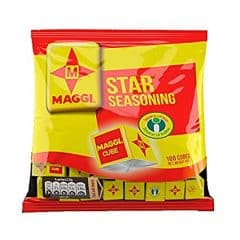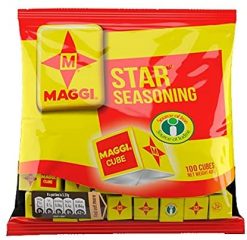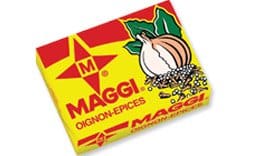Maggi cubes is an international seasoning product that is available for sale in many countries of the world. In Nigeria, the product has productively displaced traditional food seasonings such as locust beans and meat stock. Maggi cubes’ success is majorly due to their superior packaging style compared to the local alternatives.
What is Maggi Cubes made of?
Each cube of Maggi is an exquisite blend of:
- Salt
- Sugar
- Monosodium glutamate
- Cornstarch
- Onion powder and other ingredients that will keep you licking your lips for long.
Benefits of Maggi Cubes:
- The cubes are fortified with iron and other supplements to give you more than good taste.
- The iron in Maggi, for instance, protects you against iron deficiency anemia and gives you enough hemoglobin to transport oxygen across your body.
 Side Effects and Health Risks of Maggi Cubes:
Side Effects and Health Risks of Maggi Cubes:
When you use a lot of Maggi cubes, you will be exposed to some serious side effects and even more dangerous health risks even though they add great taste to your food.
Consuming too much Maggi Cubes would cause increase to your level of trans-fat, iodized salt, and monosodium glutamate (MSG), which is not ideal for your health.
Common side effects include:
- Headache
- Nausea
- Vomiting
- Fatigue
- Thirst
- Skin rash
- Increased bowel movement
The side effects mentioned above could convert into greater health risks if you persist in taking excess Maggi Cubes.
Some health risks include:
An Indiana personal injury lawyer shares his opinion: it’s important to recognize the potential health risks associated with the overconsumption of products like Maggi cubes. These products, while enhancing the flavor of food, can lead to increased levels of trans-fat, iodized salt, and monosodium glutamate (MSG). Excessive intake of these ingredients may pose serious health risks. It’s crucial for consumers to be informed about these potential dangers and for manufacturers to clearly label their products, ensuring that individuals can make safe and informed choices about their dietary intake.
Hypertension
The sodium content in Maggi cubes is high therefore it increases your chances of having hypertension in the long term. A high level of sodium in your blood causes fluid to collect around your heart and thereby elevates the pressure in your blood vessels.
Stroke and heart attack
You are prone to heart attacks if you consume an excess of Trans fat via Maggi cubes. These fat can coat your arteries and limit the flow of blood to the organs in your body. This results in stroke and heart attack if the fats clog arteries that supply sensitive organs like the brain and the heart.
The fats in your Maggi cubes come in the form of hydrogenated fat that is used commonly in processed foods and snacks. However, they are also a source of Trans fat. Trans fat is unsaturated fatty acids that occur in natural and artificial forms.
You don’t need to worry about natural Trans fats. This type of fat is a natural component of your meat and dairy diet, where they exist in relatively low amounts that is safe for your health.
Neurotoxic effects
Another likely result of excess intake of Maggi cubes is that it can restrict your nervous coordination. Maggi cubes contain MSG which can mimic glutamic to act on their receptors in the brain.
Glutamic acid acts as a neurotransmitter in the brain to stimulate nerve cells involved in involuntary and metabolic activities. Glutamic acid is found naturally in plants and food products.
In commercial products, starch is fermented to produce MSG, which is the main flavoring agent in Maggi cubes.
Nausea
Maggi cubes contain 0.5g of MSG per piece in a dietary dosage. These effects however, are only noticeable when you ingest substantial amounts of MSG, usually in excess of 3g per meal.
Even yet, only sensitive users are more likely to experience MSG’s negative effects. These are people who have been diagnosed with the MSG symptom complex.
When using Maggi cubes, however, it is best to keep it safe. If you are sensitive to MSG, you should substitute Maggi with an appropriate substitute. If you don’t react to it, keep your usage to a minimum. You won’t have to worry about MSG’s adverse effects this way. However, if at all possible, use natural herbs and spices instead of MSG-containing seasonings.
 The other ingredients like the monosodium glutamate have been linked to causing asthma, obesity and even cancer.
The other ingredients like the monosodium glutamate have been linked to causing asthma, obesity and even cancer.
You can avoid all these by generally reducing your salt and Maggi intake daily. There are also a few alternatives to using Maggi inside your food, after all before Maggi was manufactured, people have been cooking with natural spices and flavors.
Some of them are;
- Dawadawa- This is made from oil bean seeds, which is fermented, grounded and rolled into a ball and dried for preservation to be used for cooking.
- Locust beans- This another example of an olden day cooking additive that is still being used till today. Although not everybody likes the pungent smell it gives while raw, it has a very strong taste that can be used to replace Maggi.
Others are;
- Crayfish
- Meat stock
- Spices
Maggi’s a funny thing. Everyone knows it, and it does indeed make everything taste better. Many cultures, well beyond West Africa, have grown to rely on it, this little flavor explosion in a cube.
Thanks for reading through.



 Side Effects and Health Risks of Maggi Cubes:
Side Effects and Health Risks of Maggi Cubes:

